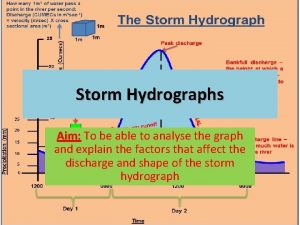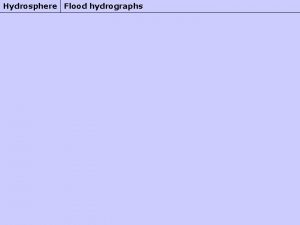Construction And Analysis of Hydrographs Microsoft Word clipart



























- Slides: 27

Construction And Analysis of Hydrographs ©Microsoft Word clipart Ballakermeen High School

Hydrograph Record of River Discharge over a period of time River Discharge The amount of water passing a point in a river. Measured in cubic metres a second (cumecs) Storm Hydrographs Show the change in discharge caused by a period of rainfall

Why Construct & Analyse Hydrographs ? To find out discharge patterns of a particular drainage basin Help predict floods, and help decide on flood prevention measures ©Microsoft Word clipart

Construction ©Microsoft Word clipart Of Storm (flood) Hydrographs

ra ph og imb yd r H 3 Rising l 2 b lim Discharge (cumecs) d oo Peak flow g llin Fa Fl Lag time 20 Base flow 1 15 10 5 0 6 12 18 24 30 Hours from start of rain storm 36 mm

Discharge (m 3/s) 3 2 1 0 12 24 36 48 30 72 Hours from start of rain storm

Rainfall shown in mm, as a bar graph Discharge (m 3/s) 3 2 1 0 12 24 36 48 30 72 Hours from start of rain storm

Discharge in m 3/s, as a line graph Discharge (m 3/s) 3 2 mm 4 1 3 2 0 12 24 36 48 30 72 Hours from start of rain storm

Rising limb Rising Discharge (m 3/s) 3 The rising flood water in the river 2 mm 4 1 3 2 0 12 24 36 48 30 72 Hours from start of rain storm

Peak flow 36 30 imb Maximum discharge in the river Rising l Discharge (m 3/s) 3 Peak flow 2 mm 4 1 3 2 0 12 24 48 72 Hours from start of rain storm

Recession limb Peak flow imb b 2 lim Rising l g llin Fa Discharge (m 3/s) 3 Falling flood water in the river mm 4 1 3 2 0 12 24 36 48 30 72 Hours from start of rain storm

Lag time imb 2 b lim Rising l g llin Fa Discharge (m 3/s) 3 Peak flow mm 4 1 3 2 0 12 24 36 48 Time difference between the peak of the rain storm and the peak flow of the river 30 72 Hours from start of rain storm

Base flow Lag time imb 2 Normal discharge of the river b lim Rising l g llin Fa Discharge (m 3/s) 3 Peak flow mm 4 1 3 2 0 Base flow 12 24 36 48 30 72 Hours from start of rain storm

Analysis ©Microsoft Word clipart

Factors influencing Storm Hydrographs • Area • Land Use • Shape • Drainage Density • Slope • Precipitation / Temp • Rock Type • Soil • Tidal Conditions ©Microsoft Word clipart

Test on Storm Hydrographs Hours from start of rain storm Discharge • Rising Limb • Falling Limb • Lag time • Rainfall • Peak flow • Base flow

Here are some theoretical interpretations of influencing factors BUT…… When interpreting hydrographs all factors must be considered together ! ©Microsoft Word clipart

Area Large basins receive more precipitation than small therefore have larger runoff Larger size means longer lag time as water has a longer distance to travel to reach the trunk river Area Rock Type Drainage Density Shape Soil Precipitation / Temp Slope Land Use Tidal Conditions

Shape Elongated basin will produce a lower peak flow and longer lag time than a circular one of the same size Area Rock Type Drainage Density Shape Soil Precipitation / Temp Slope Land Use Tidal Conditions

Slope Channel flow can be faster down a steep slope therefore steeper rising limb and shorter lag time Area Rock Type Drainage Density Shape Soil Precipitation / Temp Slope Land Use Tidal Conditions

Rock Type Permeable rocks mean rapid infiltration and little overland flow therefore shallow rising limb Area Rock Type Drainage Density Shape Soil Precipitation / Temp Slope Land Use Tidal Conditions

Soil Infiltration is generally greater on thick soil, although less porous soils eg. clay act as impermeable layers The more infiltration occurs the longer the lag time and shallower the rising limb Area Rock Type Drainage Density Shape Soil Precipitation / Temp Slope Land Use Tidal Conditions

Land Use Urbanisation - concrete and tarmac form impermeable surfaces, creating a steep rising limb and shortening the time lag Afforestation - intercepts the precipitation, creating a shallow rising limb and lengthening the time lag Area Rock Type Drainage Density Shape Soil Precipitation / Temp Slope Land Use Tidal Conditions

Drainage Density A higher density will allow rapid overland flow Area Rock Type Drainage Density Shape Soil Precipitation / Temp Slope Land Use Tidal Conditions

Precipitation & Temperature Short intense rainstorms can produce rapid overland flow and steep rising limb If there have been extreme temperatures, the ground can be hard (either baked or frozen) causing rapid surface run off Snow on the ground can act as a store producing a long lag time and shallow rising limb. Once a thaw sets in the rising limb will become steep Area Rock Type Drainage Density Shape Soil Precipitation / Temp Slope Land Use Tidal Conditions

Tidal Conditions High spring tides can block the normal exit for the water, therefore extending the length of time the river basin takes to return to base flow Area Rock Type Drainage Density Shape Soil Precipitation / Temp Slope Land Use Tidal Conditions

Remember! These influencing factors will: Influence each other Change throughout the rivers course ©Microsoft Word clipart
 How to read a hydrograph
How to read a hydrograph Microsoft official academic course microsoft word 2016
Microsoft official academic course microsoft word 2016 Microsoft official academic course microsoft word 2016
Microsoft official academic course microsoft word 2016 Word art microsoft office
Word art microsoft office Clip art word
Clip art word Microsoft official academic course microsoft excel 2016
Microsoft official academic course microsoft excel 2016 Microsoft microsoft edge startwarren theverge
Microsoft microsoft edge startwarren theverge Microsoft excel merupakan program aplikasi….
Microsoft excel merupakan program aplikasi…. Professional linkages
Professional linkages Listen and chant
Listen and chant Pulley wheel and axle
Pulley wheel and axle Gtt design process
Gtt design process Latin word for place
Latin word for place Attributes of tokens in compiler design
Attributes of tokens in compiler design Word processing activity 1
Word processing activity 1 How to make picture puzzle in microsoft word
How to make picture puzzle in microsoft word Bingo template word
Bingo template word Microsoft word adalah software yang diproduksi oleh
Microsoft word adalah software yang diproduksi oleh Ambiente word
Ambiente word Microsoft word memo
Microsoft word memo Toolbar word
Toolbar word Word columns
Word columns Qka eshte microsoft word
Qka eshte microsoft word Aplikasi pengolah kata buatan microsoft adalah
Aplikasi pengolah kata buatan microsoft adalah Microsoft word 2014
Microsoft word 2014 Tombol size button terletak di bagian pojok
Tombol size button terletak di bagian pojok Langkah langkah memulai microsoft word
Langkah langkah memulai microsoft word Barra de estado en word
Barra de estado en word

















































